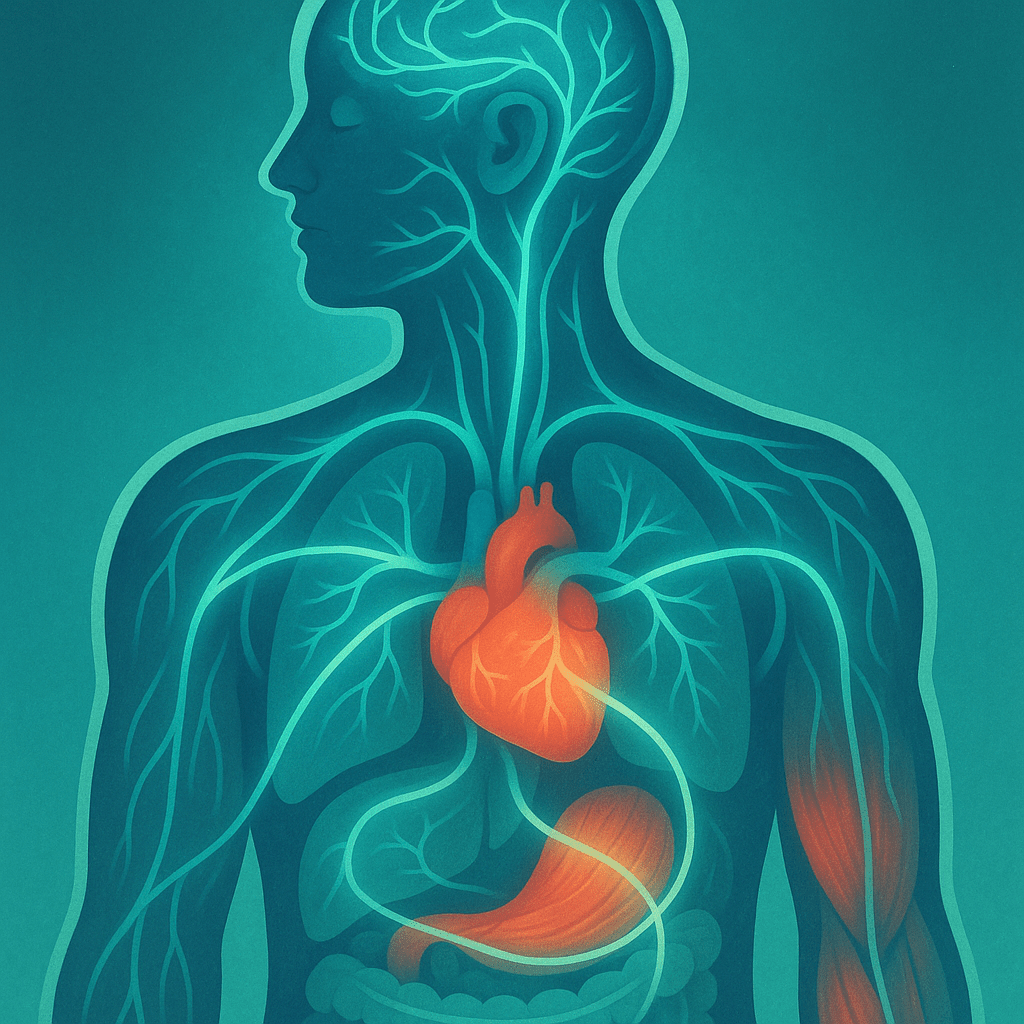Potassium and magnesium are two vital minerals that our bodies cannot function without. These electrolytes are involved in many physiological processes, from muscle contractions to nerve signal transmission.

Despite their importance, many people do not pay enough attention to the levels of these minerals in their bodies or are not even aware of how essential they are to our health.
Potassium (K) is a major electrolyte inside cells that regulates fluid balance and helps maintain a normal heart rhythm. Meanwhile, magnesium (Mg) is a cofactor in over 300 enzymatic reactions, including protein synthesis, muscle and nerve function, glucose control, and blood pressure regulation.
In this article, we will explore why these two minerals are indispensable in our bodies, what are the signs of their deficiency, how to ensure sufficient levels, and when to consider supplements. Understanding the importance of potassium and magnesium and knowing how to maintain their optimal levels can improve our overall health and well-being. Those interested in nervous system health may also want to consider vitamins for the nervous system, which, together with potassium and magnesium, help maintain optimal nervous system function.
Main functions and biological role of potassium and magnesium
Potassium and magnesium perform many functions necessary for the proper functioning of the body. Together, these electrolytes regulate many physiological processes, the disorders of which can cause serious health problems.
Benefits of potassium for the body
Potassium is one of the most important electrolytes in our body. Its role is particularly significant in the following areas:
- maintaining fluid balance in and between cells
- maintaining the electrical potential of cell
- membranes, necessary for the transmission of nerve signals
- regulating heart rhythm and ensuring heart muscle function
- regulating muscle contraction and relaxation processes
- regulating blood pressure
- participating in carbohydrate metabolism
A normal level of potassium in the blood is necessary for the proper functioning of nerves and muscles. Some functions of potassium are especially important for athletes – it helps prevent muscle cramps and ensures good muscle functioning during intense training.
Benefits of magnesium for the body
Magnesium is the fourth most abundant mineral in the human body. Its role is extremely broad:
- participates in more than 300 enzymatic reactions as a cofactor
- necessary for the synthesis of ATP (adenosine triphosphate), the main energy molecule
- regulates muscle contraction and relaxation
- supports normal nervous system activity and neurotransmitter function
- participates in DNA and RNA synthesis
- helps maintain normal heart rhythm
- participates in bone structure formation
Magnesium deficiency can affect almost all body systems. Scientific studies show that optimal magnesium levels help reduce the effects of stress on the body, improve sleep quality and can reduce the frequency of migraine attacks.
The importance of electrolytes for the body’s functioning
Potassium and magnesium, along with sodium and calcium, form the main group of electrolytes that ensure proper fluid balance in the body. They regulate osmosis processes, help maintain the right amount of water in cells and extracellular fluid. Electrolytes are also involved in nerve impulse transmission and are essential for normal muscle contraction.
People who are active in sports or those who work in hot environments and sweat a lot may need additional electrolyte supplementation. KIKI Health oral electrolytes can be useful for quickly restoring the balance of lost minerals after intense physical exertion or sweating.
Causes and Symptoms of Potassium and Magnesium Deficiency
Mineral deficiencies can occur for a variety of reasons, and if not recognized and treated in time, deficiencies can lead to serious health problems. It is important to understand what causes a deficiency in these minerals and how to recognize it.
Main causes of deficiency
- Insufficient dietary intake – unbalanced diet, poor fruit and vegetable intake
- Intensive sweating – especially in the summer or during intense training
- Certain medications – diuretics, laxatives, some antibiotics
- Indigestion disorders – chronic diarrhea, vomiting
- Alcohol consumption – promotes the excretion of minerals in the urine
- Chronic diseases – kidney disease, diabetes, gastrointestinal disorders
Summer and sweating are particularly significant factors that increase the risk of mineral deficiency. When the body sweats, not only water is lost with sweat, but also important minerals, including potassium and magnesium. During the hot season, people who actively play sports outdoors or do physical work must be especially careful and ensure sufficient mineral supplementation.
Human intestinal health is also directly related to the absorption of minerals. A good intestinal microbiome helps to better absorb nutrients, including minerals. For this reason, a healthy gut microflora, which can be maintained by taking probiotic supplements, is an important part of mineral balance.
Symptoms of mineral deficiency
Symptoms of potassium deficiency (hypokalemia) may include:
- muscle weakness and cramps
- fatigue and lack of energy
- constipation
- heart rhythm disorders
- high blood pressure
- paresthesia (tingling or numbness)
Symptoms of magnesium deficiency (hypomagnesemia) are most commonly:
- muscle twitching and cramps
- anxiety and irritability
- insomnia and sleep disorders
fatigue - headaches and migraines
- heart rhythm disorders
- increased sensitivity to noise
Long-term mineral deficiency can have serious health consequences, including osteoporosis, cardiovascular disease, weakened immunity, and chronic fatigue. Therefore, it is important to recognize early signs of deficiency and take steps to correct them.
Risk groups
Some people are at higher risk of developing potassium and magnesium deficiency:
- Athletes – due to intense sweating during training
- Elderly people – due to reduced mineral absorption and more frequent medication use
- People with chronic diseases – especially kidney disease, diabetes, gastrointestinal disorders
- People taking certain medications – diuretics, laxatives, corticosteroids
- Pregnant women – due to increased mineral needs
- Vegetarians and vegans – if their diet is not properly balanced
It is recommended that individuals in these risk groups have their blood mineral levels checked regularly and consult a doctor or nutritionist about their individual needs.

Dietary Sources of Potassium and Magnesium
A balanced diet rich in a variety of foods is the key to ensuring adequate levels of potassium and magnesium in the body. Let’s take a look at the main sources of these important minerals.

Magnesium and Potassium Food Sources
Main sources of potassium:
- Fruits: bananas, apricots, avocados, citrus fruits, kiwis
- Vegetables: potatoes (especially with skin), spinach, broccoli, tomatoes, pumpkin
- Legumes: beans, lentils, peas
- Nuts and seeds: almonds, walnuts, sunflower seeds
- Whole grains: brown rice, oats, wheat bran
- Animal products: fish (especially salmon), milk, yogurt
Main sources of magnesium:
- Leafy green vegetables: spinach, kale, arugula
- Nuts and seeds: pumpkin seeds, sunflower seeds, almonds, cashews
- Whole grains: whole wheat bread, brown rice, oats
- Legumes: black beans, lentils, chickpeas
- Cocoa and dark chocolate (over 70% cocoa)
- Seafood: salmon, mackerel, tuna
- Fruit: bananas, avocados, dried figs
Mineral water as a source of minerals
Mineral water can be a good additional source of magnesium and potassium. Different types of mineral water have different amounts of minerals, so it is important to pay attention to the information provided on the label. Some mineral waters can contain up to 100 mg of magnesium and 10 mg of potassium per liter.
Popular mineral waters in Lithuania such as “Vytautas”, “Birutė” or “Druskininkai” have different concentrations of minerals. For example, “Vytautas” has a higher magnesium content, so an additional source of this mineral may be useful.
Healthy diet and mineral absorption
To ensure optimal mineral absorption, it is important not only to consume sufficient amounts of them, but also to pay attention to the following aspects:
- Vitamin D improves the absorption of calcium and magnesium
- Excessive sugar and salt consumption can disrupt the mineral balance
- Phytic acid, which is present in some grains and legumes, can reduce the absorption of minerals – it is recommended to soak or ferment these products
- Alcohol and caffeine increase the excretion of minerals in the urine
A balanced diet, including a variety of food products from different food groups, will help ensure sufficient mineral levels in the body. It is recommended to consume at least 5 servings of various fruits and vegetables daily, and regularly include nuts, seeds and whole grains.
Is it worth taking supplements?
While it is best to get your minerals from natural food sources, in some cases you may need to take supplements. Immunity vitamins for children and adults often include important minerals, including magnesium and potassium.
Supplements are worth considering in the following cases:
- When a laboratory test shows a mineral deficiency
- Having specific health conditions (e.g. heart rhythm disorders)
- Taking medications that deplete mineral levels (e.g. diuretics)
- When exercising intensely, especially in hot weather
- Following a strict vegan or other restrictive diet
It is important to remember that food supplements should only be taken after consulting a doctor or nutritionist. Too much mineral intake can also be harmful, especially in certain health conditions, such as kidney failure.
Prevention and monitoring: how to maintain optimal mineral levels
To avoid potassium and magnesium deficiencies and ensure their optimal levels in the body, it is important to regularly monitor your health and take preventive measures. This is especially important for risk groups and during seasonal changes.
Mineral level tests and their importance
Regular blood tests are one of the most reliable ways to assess the level of minerals in the body:
- A complete blood count can show general health indicators
- Electrolyte testing includes determining the level of potassium and sodium
- Special tests can determine the level of magnesium in serum and erythrocytes
- Comprehensive testing programs can assess a wider range of minerals
It is important to remember that the level of potassium and magnesium in the blood does not always accurately reflect their level in the cells, so additional tests or assessment of clinical symptoms are sometimes necessary.
Seasonal fluctuations and prevention
In the summer, when sweating becomes more intense, mineral balance can be disrupted more quickly:
- Increase the consumption of mineral-rich foods

- Drink plenty of water, preferably mineral water
- Limit the consumption of alcoholic and caffeinated beverages
- Consume electrolyte-rich beverages after intense physical exertion or prolonged exposure to hot environments
- Monitor your well-being and pay attention to signs of mineral deficiency
Regular preventive health check-ups help to identify mineral imbalances in time and take measures to correct them. Research programs for athletes often include determining the amount of minerals, which is especially important for people who are actively involved in sports.
Recommendations for special groups
Athletes:
- Monitor your sweating intensity and replace lost fluids and minerals
- Consume electrolyte solutions after intense training
- Regularly check your blood mineral levels, especially before important competitions
- Create a diet plan that ensures sufficient mineral levels
For older people:
- Regularly check your health, including your mineral levels
- Pay attention to the side effects of the medications you are taking
- Ensure adequate fluid intake
- Include a variety of mineral sources in your diet
For people with chronic diseases:
- Consult your doctor about your individual mineral needs
- Regularly monitor your mineral levels according to your doctor’s recommendations
- Be aware of drug and supplement interactions
Prevention and early recognition of deficiencies are the best ways to avoid serious health problems related to mineral deficiencies. Regular health checkups, a balanced diet, and paying attention to your body’s signals will help maintain optimal levels of potassium and magnesium in the body.
Conclusions
Potassium and magnesium are essential minerals that are necessary for many body functions. They are involved in regulating heart rate, muscle and nervous system activity, maintaining fluid balance, and many other important processes. Despite their importance, a large proportion of people do not get enough of these minerals due to an unbalanced diet, heavy sweating, the use of certain medications, or chronic diseases.
Symptoms of mineral deficiency can vary from muscle cramps and fatigue to heart rhythm disorders and high blood pressure. People in risk groups should pay special attention to their mineral status: athletes, the elderly, and those with chronic diseases.
A healthy and balanced diet, rich in fruits, vegetables, whole grains, nuts, and seeds, is the main way to ensure adequate potassium and magnesium intake. In certain cases, when food is not enough or in the presence of specific health conditions, dietary supplements can be considered, but always after consulting a healthcare professional.
Regular monitoring of mineral levels, especially during the summer or during intense physical activity, will help prevent deficiencies and related health problems. Remember that prevention and early recognition of deficiencies is the best way to ensure optimal health and well-being.
Frequently Asked Questions (FAQs)
What are the main symptoms of potassium and magnesium deficiency?
Muscle cramps, fatigue, irregular heartbeat, tingling, and high blood pressure are common warning signs.
What foods are the best sources of potassium and magnesium?
Leafy green vegetables, legumes, nuts, seeds, bananas, and whole grains are high in both minerals.
Who is at highest risk for deficiency?
Athletes, the elderly, patients taking certain medications, and those with chronic illnesses are at highest risk.
Should I take potassium or magnesium supplements?
Supplements may be helpful if you have been diagnosed with a deficiency or increased need, but always consult a healthcare professional first.
How can I get my potassium and magnesium levels tested?
A blood test ordered by your doctor can accurately assess your mineral status; clinics offer programs for a comprehensive assessment of the elements.
